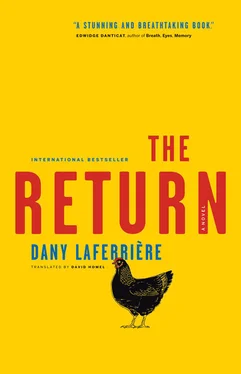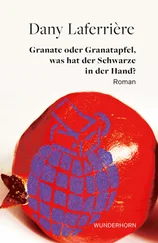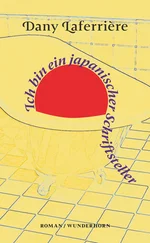As we get close to Pétionville
the girls seem younger.
Their skirts shorter.
Their gazes more meaningful.
This war is as ferocious
as the one between the Cité Soleil gangs.
Girls have always paid
a higher price when the city
turns into a jungle
and the night becomes a trap.
A hungry cock
spares no one
in its path.
Though the hour is late, we detour onto the Delmas road to go see Frankétienne. The doctor wants to buy a painting in his latest style. Frankétienne is so prolific an artist he can ruin a collector. He welcomes us so uproariously he must have woken up the whole neighborhood. The ogre in his lair. Despite the doctor’s rich praise, Frankétienne is reticent about selling him a painting from his personal collection. The rich doctor lets him know money is no object, but the painter digs in his heels. Coffee arrives — Frankétienne hasn’t touched alcohol since his illness. Right now he is working on a novel whose voluminous manuscript stretches across his wide worktable in spectacular disorder. Everything is larger than life with him. Bare-chested. Gargantuan appetite. Face as red as a boiled lobster. The wild enthusiasm of a man obsessed with literature and painting. He has painted several thousand canvases and his first great novel, Ultravocal, has metastasized into some thirty volumes over forty years. Urban turbulence is the only setting for this ogre. Seeing how perplexed I am by this expanse of paper scribbled with obscure signs that look more like musical notes than letters of the alphabet (I wouldn’t put it past him to invent a new vocabulary and grammar in order to write a truly original book), he announces that his next work will be an opera-novel. What’s an opera-novel? asks the chauffeur who seemed to be dozing in the corner. Frankétienne turns to him abruptly: you’re the first one who ever dared ask me that question. Everyone else pretends to understand. I can’t explain it, but when I finish the book, you’ll see, and in the meanwhile, allow me to give you a painting. He disappears into his storehouse and returns with an enormous canvas we’ll never be able to get into the car. He disassembles the frame with such energy he nearly rips apart the painting. He throws it into the trunk of the Buick 57 as the doctor-collector looks on in astonishment, empty-handed, his pockets still stuffed with money.
On the highway a desperate woman waves at us to stop. The doctor orders the chauffeur to drive on. Apparently it’s the bandits’ latest trick for robbing travelers. She’s the bait, and the thieves are hiding in the thicket. But what if it was true? If she really did need help? I’ll read about it in the paper.
For the scene to be believable
they kidnap a poor woman
and promise to set her free
if she manages to trap
one of those luxury automobiles whose owner
has a villa on the mountainside.
In Le Nouvelliste I read about the tragic story of a woman who ended up by the side of the highway after an accident, with her son. No one wanted to stop. The boy bled to death. Months afterward, the mother, having lost her mind, was still asking motorists for help. Even the murderers who have set up shop in this desolate region avoid her. They’re afraid of looking her in the eye.
For every hand that points
a revolver at you
another hand will offer you a fruit.
The hateful words of one
are erased by the other’s smile.
We can’t seem to move
between these two extremes.
How Do You Live at Seventy inside a Museum?
We leave the lights of Pétionville behind.
Already there are peasant huts
lit by lamps
the wind is trying to blow out.
What I need
is a little room
with a window
from which I can see the green countryside.
There I could write the book
I have been ruminating on for so long.
We drive down a road made of ocher earth
and stop at the red gate.
The servants arrive rubbing their eyes.
Three cars, in lieu of farm animals,
are sleeping in the yard.
The doctor, his wife and their numerous domestics
are the only ones living here.
The children have scattered across the planet.
This man lives in a veritable museum. Three salons filled with works by major Haitian painters. The pioneers: Wilson Bigaud, Rigaud Benoît, Castera Bazile, Jasmin Joseph, Préfète Duffaut, Enguerrand Gourgue, Philomé Obin and even a Hector Hyppolite. Then the generation of Cedor, Lazare, Luce Turnier, Antonio Joseph, Tiga, and contemporaries like Jérôme, Valcin, Séjourné, and the Saint-Soleil group with Levoy Exil, Denis Smith and Louisiane Saint-Fleurant. An entire room is devoted to Frankétienne. Almost everyone is there. The doctor follows behind me, smiling. I’m impressed by the choice of painters, and the choice of certain works intrigues me just as much. And even more so the way they are hung. I can hear their dialogue in the night. Why no Saint-Brice? He lowers his eyes. My wife is afraid of Saint-Brice. Most of Saint-Brice’s paintings are of heads without bodies, and they frighten my wife. I did own a small Saint-Brice that I had the misfortune of putting in the bedroom. My wife woke up in the middle of the night, saw the picture shining in the darkness and started screaming like a madwoman. I took it down immediately and put it in the hallway, but that was worse. She refused to leave the bedroom, even to go to the toilet. I had to exchange my only Saint-Brice for two Séjournés. It’s hard to imagine what a collector feels when he has to give up a major piece. Well, I had to get rid of it. Shall we have a drink?
We move into the small salon — a figure of speech because it is much bigger than any normal room of its kind. Two servants magically appear bearing plates loaded down with cold cuts. I like the rich when they know how to receive guests. Food: cheeses, ham, pâté, smoked salmon. Drink: rum, wine, whisky. I don’t dare ask him where the wealth comes from. I know what you’re thinking. If you were my father’s friend, then how could you be rich? He begins to laugh. We never knew if we’d have anything to eat back then. But your father managed to overcome even the most difficult obstacles. He knew how to get himself invited by rich women who are always intrigued by insolent young men. Your mother suspected me of pushing him into the arms of other women. But he was the seducer, and like any good seducer he never tried to seduce. Sometimes he wasn’t even aware of the chaos he created along the way. How many times did I have to point out to him that some woman was feasting on him with her eyes? But he had politics on the brain — for him, that meant getting his ideas out into the world. For him, women were just potential party militants, though they were bewitched by that powerful energy he gave off. His incandescence attracted us. I saw things, but I suppose that’s not what you want to talk about. . I don’t expect anything. I’m happy just to listen to someone who knew my father when he was twenty. Your father hated General Magloire for clinging to power despite the Constitution: that was the basis of everything. Either we were in prison or hiding out in the country. And then? The results, like everything our generation did, were disastrous. Jacques died, your father went into exile and François retired to the country. I was the only one who stayed, and guess what you do in Port-au-Prince? You make money. No, he said, smiling, not so fast. First we were in politics. The revolution, you mean? We made the revolution when we were twenty. A pause. For fifteen years I was minister of Commerce; that’s a good place to make money. Most of the merchants downtown are smugglers who shower the minister with gifts so he’ll turn a blind eye to their clandestine operations. I closed one eye and kept the other open. Because those same merchants won’t think twice about denouncing you as soon as things get a little hot.
Читать дальше












